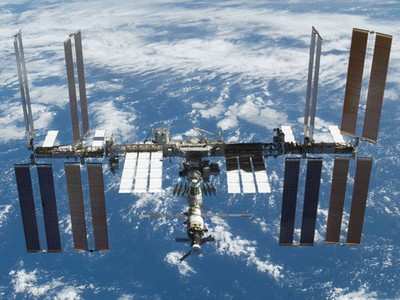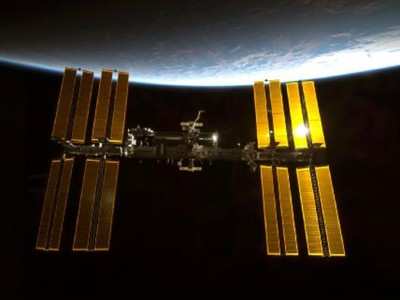Mon, Feb 07, 2011
Top Topics Included Reducing Costs, Increasing Use
The International Space Station partner agencies met Thursday by
videoconference to discuss coordinating the increased use of the
space station as a research laboratory. The agencies want to
continue using the station as a test-bed for exploration and find
innovative ways to reduce costs while increasing use.

NASA Image
The Multilateral Coordination Board (MCB) meeting included
senior representatives from NASA; the Canadian Space Agency (CSA);
the European Space Agency (ESA); the Russian Federal Space Agency
(Roscosmos); and the Japanese Ministry of Education, Culture,
Sports, Science and Technology (MEXT). As the senior management
board, the MCB meets periodically to ensure coordination of station
operations and activities among the partners.
The MCB reaffirmed its commitment to reduce operational costs,
develop an integrated transportation plan and maximize return by
increasing research aboard the station while developing techniques
for future exploration outside Earth's orbit.
The MCB members reviewed ongoing international use of the
station as a laboratory for scientific research, technology
development and testing and educational activities. In the six
months between March and September 2010, the five partner agencies
have provided 195 research opportunities on the orbiting outpost
for 385 investigators from 29 countries. Increasing the station's
use as a unique laboratory is of paramount importance to the
international partners. The International Space Station has proven
to be an important platform for research in biology and
biotechnology, Earth and space science, human physiology, physical
science, technology development and education.

NASA Image
The partners also renewed their commitment to use station
resources and observation capability to assist in humanitarian
needs such as aiding in disaster recovery, tracking oil spills and
monitoring climate change.
All of the partners also recognize the station's role in
inspiring students around the world to learn about science,
technology, engineering and mathematics. More than 30 million
students have participated in human spaceflight through
communications downlinks and interactive experiments with station
astronauts.
The governments of Japan and the Russian Federation have
approved continued ISS operations beyond 2016. The NASA
Authorization Act of 2010 extended operations until at least 2020.
ESA and CSA are working with their respective governments to reach
consensus about the continuation of the station.
More News
Pilot Also Reported That Due To A Fuel Leak, The Auxiliary Fuel Tanks Were Not Used On June 4, 2025, at 13:41 eastern daylight time, a Piper PA-23, N2109P, was substantially damage>[...]
Have A Story That NEEDS To Be Featured On Aero-News? Here’s How To Submit A Story To Our Team Some of the greatest new stories ANN has ever covered have been submitted by our>[...]
From 2023 (YouTube Edition): Reflections on War’s Collective Lessons and Cyclical Nature The exigencies of war ought be colorblind. Inane social-constructs the likes of racis>[...]
Aero Linx: Colorado Pilots Association (CPA) Colorado Pilots Association was incorporated as a Colorado Nonprofit Corporation in 1972. It is a statewide organization with over 700 >[...]
High Speed Taxiway A long radius taxiway designed and provided with lighting or marking to define the path of aircraft, traveling at high speed (up to 60 knots), from the runway ce>[...]
 NTSB Prelim: Piper PA-23
NTSB Prelim: Piper PA-23 ANN FAQ: Submit a News Story!
ANN FAQ: Submit a News Story! Classic Aero-TV: One Mans Vietnam
Classic Aero-TV: One Mans Vietnam ANN's Daily Aero-Linx (07.03.25)
ANN's Daily Aero-Linx (07.03.25) ANN's Daily Aero-Term (07.03.25): High Speed Taxiway
ANN's Daily Aero-Term (07.03.25): High Speed Taxiway




